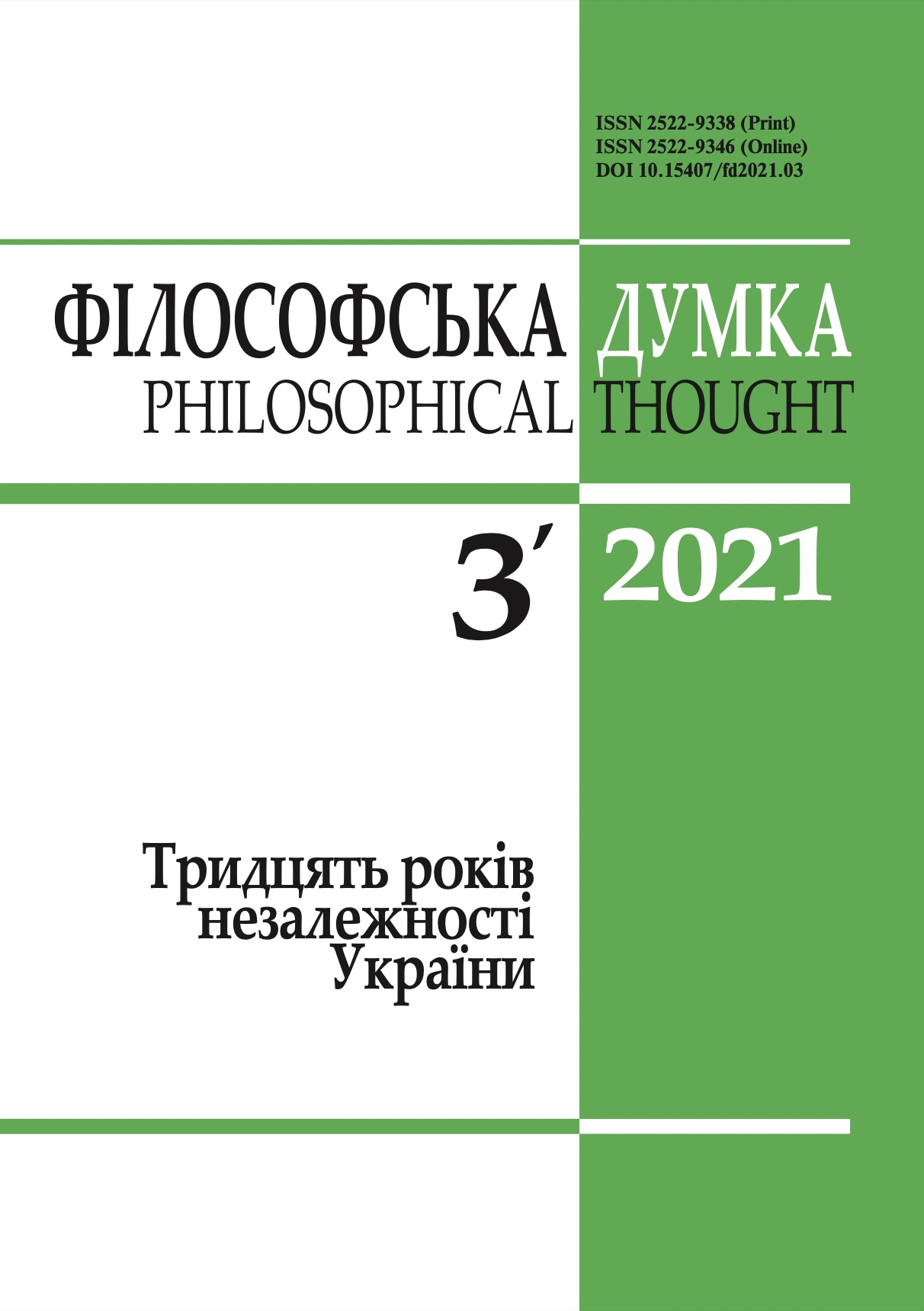TROUBLE WITH THE BIOGRAPHY OF THE SOVEREIGN: HISTORIOGRAPHY, ARCHIVES AND NATIONAL MEMORY
DOI:
https://doi.org/10.15407/fd2021.03.092Keywords:
sovereignty, national memory, archive, historiography, recordAbstract
The proposed article is an exploration of realistic social ontology, devoted to the study of the in- teraction between national memory, historiography and archives as defining social institutions of the modern era. The study focuses on the problems of formation and transformation of per- ceptions of the past of the national community — the bearer of sovereignty. During the analysis, the author concludes that national memory, archives and historiography are endowed with their own dynamics, and the relationship between them is a changing constellation of relations, that has undergone a complex evolution over the last two centuries. Beginning in the 19th century, the nature of relations changed in the direction of emancipation of archives from the guidelines of official historiography, distancing historiography from the exercise of state power, and the emer- gence of a new memorial culture in the late twentieth century. The result of these changes was the emergence of affirmative historiography, which has a significant impact on public life. The author concludes that the urgent problem of today is to create conditions for conflict-free interaction of all participants in the politics of memory in order to avoid politicization caused by inconsist- encies in the interpretation of past events.
References
Assman, A. (2017). Has the connection of times broken? The rise and fall of the temporal regime of The Modern [In Russian]. Moscow: Novoe literaturnoe obozrenie.
Bachmann-Medic, D. (2017). Cultural turns. [In Russian]. Moscow: Novoe literaturnoe obozrenie.
Blowin, F., Rosenberg, W. (2017). The Origin of the Past. "Authenticity" for historians and archi- vists. [In Russian]. St. Petersburg: Evropeiskiy universitet v Sankt-Peterburge
Burke, P. (ed.). (2004). New perspectives of historiography. [In Ukrainian]. Kyiv: Nika-Center.
Burke, P. (2015). What is cultural history? [In Russian]. Moscow: Vyshaya shkola ekonomiki
Connenton, P. (2004). How societies remember. [In Ukrainian]. Kyiv: Nika-Center.
Derrida, J. (1995). Archive Fever: A Freudian Impression. Diacritics. Vol.25. Issue 2. 9-63. Dupont-Melnichenko, J., Adadurov, V. (2001). French historiography of the XX century [In Ukrainian]. Lviv: Classics.
https://doi.org/10.2307/465144
Ferraris, M. (2014). Manifesto of new realism. Transl. from Italian. State University of New York Press.
Ferraris, M. (2014). Total Mobilization. The Monist, Vol. 97, No. 2, 200-221.
https://doi.org/10.5840/monist201497214
Ferraris, M. (2010). Where are you? Mobile phone ontology. [In Russian] Moscow: Novoe literaturnoe obozrenie.
Foucault, M. (2003). Archeology of knowledge. [In Ukrainian]. Kyiv: Osnovy.
Habermas, Yu. (2005). Political works. [In Russian]. Moscow: Praxis.
Kasyanov, G. (2018). Past continuous: Historical policy of the 1980s - 2000s. Ukraine and its neighbors. [In Ukrainian]. Kyiv: Laurus, Anthropos-Logos-Film.
Lachman, R. (2016). What is historical sociology? [In Russian]. Moscow: Delo.
Lubbe, G. (2016). Keeping up with the times. Short staying in the present. [In Russian]. Moscow: Vyshaya shkola ekonomiki
Meggil, A. (2007). Historical epistemology. [In Russian]. Moscow: Canon +, Rehabilitation.
Mere, J. (2003). The principle of sovereignty. History and foundations of modern power. [In Ukrai- nian]. Lviv, Calvariya.
Novak, A. (2009). Historian on the battlefield for memory. [In Ukrainian]. Ukraina moderna, 15 (4), 95-102.
Olick, J.K. (1999). Collective Memory: The Two Cultures. Sociological Theory, Vol. 17, No. 3, 333-348.
https://doi.org/10.1111/0735-2751.00083
Portnov, A. (2013). Stories for home use. Essays on Polish-Russian-Ukrainian triangular memory. [In Ukrainian]. Kyiv: Kritika
Rock, P. (2016). A Brief History of Record Management at the National Archives. Legal In- formation Management, 16. 60-64.
https://doi.org/10.1017/S1472669616000189
Rousseau, J.-J. (1999). On the social agreement, or Principles of Political Law. [In Ukrainian]. Kyiv: Port-Royal.
Sieyès, E.-J. (1888). Qu'est-ce que le tiers état? Société de l'Histoire de la Révolution Française,51-117. Retrieved from: https://fr.wikisource.org/wiki/Qu'est-ce_que_le_tiers_état_%3F
Tchaikovsky, A.S. (2014). Archival Affairs of Ukraine 1938-1960. [In Ukrainian]. Arkhivy Ukrainy, 6 (294), 74-91.
Yakovenko, N. (2007). Introduction to history. [In Ukrainian]. Kyiv: Kritika.
Yermolenko, V. (2018). Flowing ideologies. Ideas and policies in Europe XIX-XX centuries. [In Ukrainian]. Kyiv: Dukh i Litera.
Downloads
-
PDF (Українська)
Downloads: 192
Published
How to Cite
Issue
Section
License
Authors who publish with this journal agree to the following terms:
- Authors retain copyright and grant the journal right of first publication.
- Authors are able to enter into separate, additional contractual arrangements for the non-exclusive distribution of the journal's published version of the work (e.g., post it to an institutional repository or publish it in a book), with an acknowledgement of its initial publication in this journal.
- Authors are permitted and encouraged to post their work online (e.g., in institutional repositories or on their website) prior to and during the submission process, as it can lead to productive exchanges, as well as earlier and greater citation of published work (See The Effect of Open Access).


